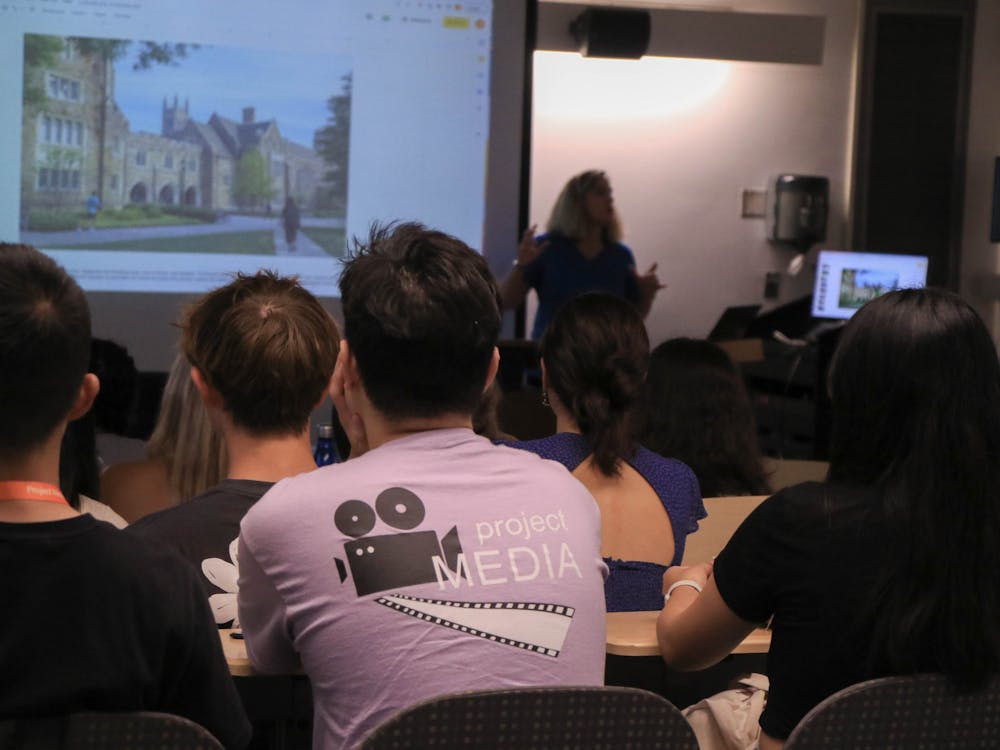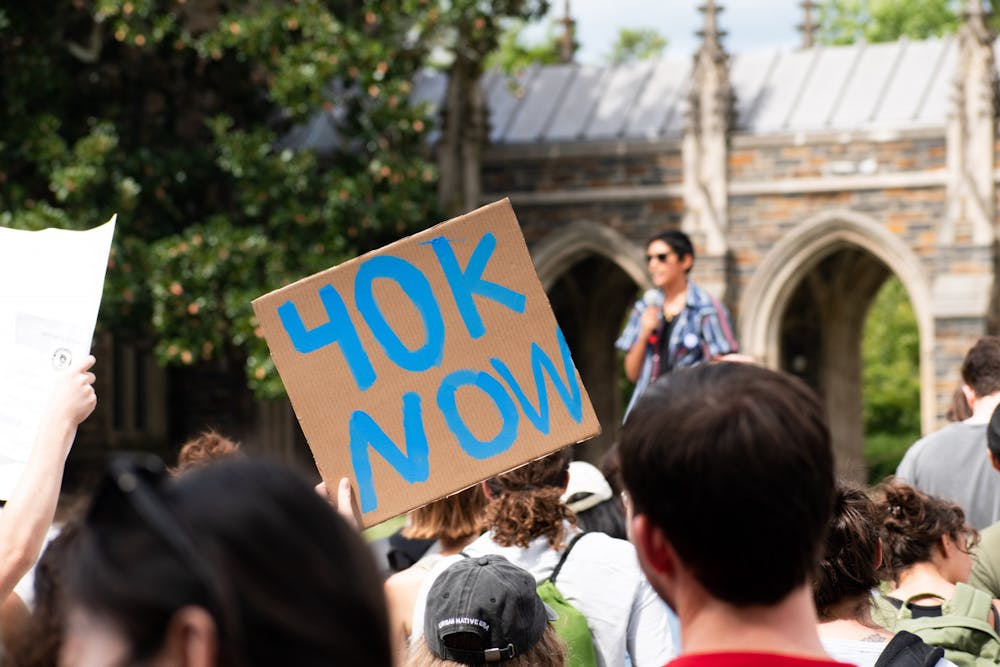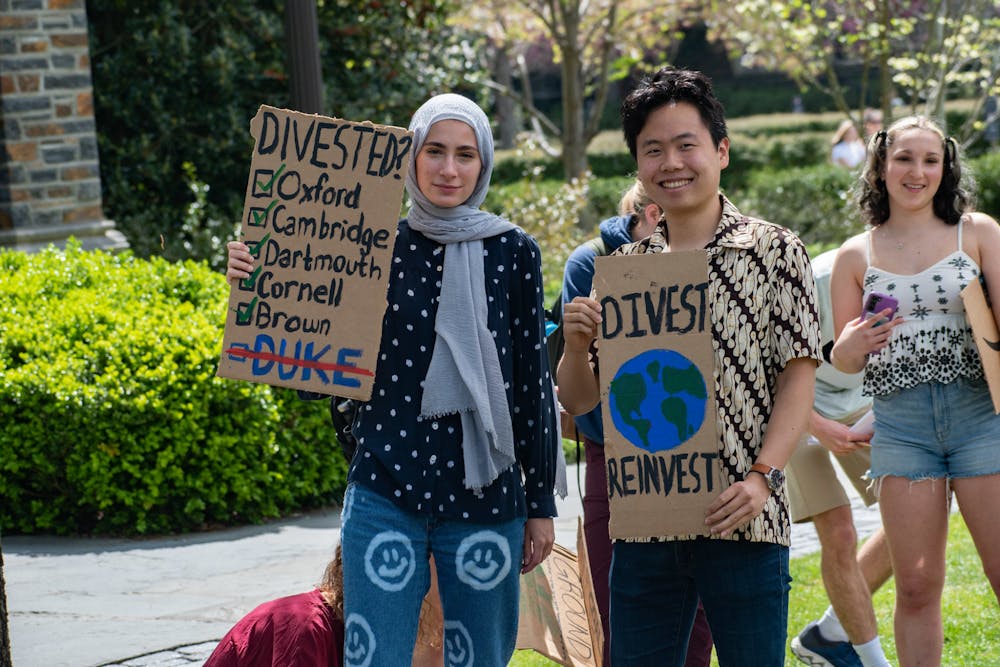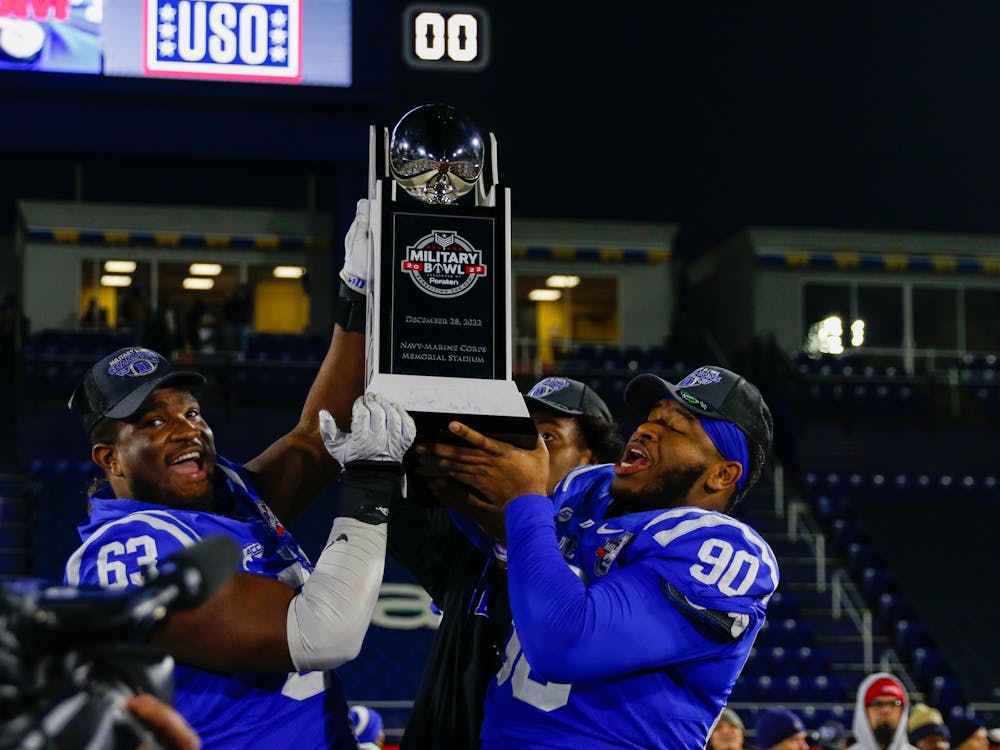As a monumental year comes to a close and the Duke community reflects on the transitions of 2022, The Chronicle revisits the stories that have shaped the year.
We celebrated LDOC, FDOC, and all the little moments in between. This year, chapters of the University’s history came to an end while the Blue Devils prepare to enter Duke’s next century.
An evolving residential and campus life

Duke’s residential and campus life saw a flurry of changes, from the effects of the implementation of QuadEx to the uncertain future of selective living groups.
Following the announcement in the fall of 2021, the University implemented the QuadEx residential program in the fall of 2022. The initial changes saw adjustments of responsibilities for residential assistants, the introduction of Faculty Fellows, and ongoing efforts to build identities for each quad.
In a moment of reflection, The Chronicle spoke with alums who advocated for housing reform about the years-long journey of implementing the new housing model.
But there have also been losses of traditions. Under QuadEx’s “all-gender housing model,” the Baldwin Scholars lost their female-only section. Non-Greek selective living groups faced uncertainty about their future structure and conflicting messages from the administration regarding recruitment. The future of SLGs on campus remains uncertain.
The Class of 2026 was the first to experience an overhaul in orientation programming, another result of QuadEx. Administrators have referred to Experiential Orientation as the largest change in new student programming since 1995. During O-week, The Chronicle visited some of these programs and talked to first-years and orientation leaders about the new program, which cost $1 million more than the traditional O-week experience.
The University loosened some aspects of its alcohol policy, notably removing the policy that banned all kegs on campus. In the fall, Duke released a new QuadEx initiative called Fun @ Duke, that allows SOFC-approved student groups to purchase alcohol using SOFC funds. But students still expressed mixed reactions as the initiative’s efficacy remains to be seen.
And as the Bryan Center prepares for renovations that could cost up to $110 million, cultural and identity groups are fighting back in search of more equitable space allocations for the organizations. Cultural groups have discussed demands and shared campus grievances at a teach-in and caucus.
Post-pandemic effects
The University slowly removed COVID-19 protocols that had become a part of campus life. Duke eliminated contract tracing in February. Then a month later, it ended required surveillance testing for asymptomatic vaccinated students. By late September, masks in classrooms were no longer required.
Students were welcomed back to campus in the fall with inflated food prices in campus eateries, following worldwide inflation trends. In response, the Karsh Office of Undergraduate Financial Support provided an additional 300 food points per semester.
And one lasting effect of COVID-19? Labor shortages. Duke Dining and service workers described feeling overworked and underappreciated as shortages persisted two years after the start of the pandemic.
A big year for labor unions

The Duke University Press Workers Union won its election to unionize in February and was officially recognized by the National Labor Relations Board in March. In August, the NLRB denied Duke’s final appeal to contest the March certification of the DUP Workers Union. Also among staff, the Thompson Writing Program faculty fought for renewability as the University worked to restructure the Writing 101 program.
The Graduate Student Union had a significant year. They demanded earlier grand releases and paid parking passes, launched a campaign for formal recognition on the new deans’ first day, rallied for increased stipends on labor day and attempted to deliver a demand letter to the administration. In October, the Graduate and Professional Student Government’s Student Affairs Committee voted to support the Union and called on the administration not to interfere with the unionization process.
Although the University did not support unionization efforts, they did increase the minimum wage for students and employees over the summer.
Administrative changes
Alongside policy and coaching transitions, Duke experienced a plethora of administrative changes in 2022.
Former Trinity College Dean Valerie Ashby was named president of the University of Maryland, Baltimore County. Vice Provost Gary Bennet was named her successor. Provost Sally Kornbluth was named the next president of the Massachusetts Institute of Technology. Also, the Duke Graduate School got a new dean in Suzanne Barbour.
Michael Schoenfeld, former vice president for public affairs and government relations and chief communications officer, left Duke at the end of July after 14 years as the University’s Chief Communications Officer. Also, Kyle Cavanaugh, former vice president for administration, retired from his post at Duke to join the NBA as their President of Administration.
Local and campus activism

This was a big year for climate activism on campus. In April, the Duke Climate Coalition filed a legal complaint against the University and held a protest in front of the Allen Building. Then, the student body voted overwhelmingly in support of divestment from “companies that explore for or develop fossil fuels.”
Duke has not committed to divesting, instead launching a new University course about climate change and announced the Climate Commitment, which aims to increase the role of the University in tackling the climate crisis. The Undergraduate Environmental Union — a subcommittee within DSG — voiced that they believed the Climate Commitment does not go far enough and called for more student input.
The Chronicle reported as the United States Supreme Court overturned Roe v. Wade. In the immediate wake of the early release of the draft decision, protestors lined up outside the State Capitol building in Raleigh, and The Chronicle looked into what a possible post-Roe future might look like in North Carolina.
Amid policy debates, Duke Health has committed to continuing to provide abortion services as long as it remains legal.
As a monumental midterm election season came and went, The Chronicle spoke with candidates, voters, and journalists before, during and after Election Day. After all the votes were tallied, the Republican party fell just one seat in the NC Senate short of a supermajority in both General Assembly chambers.
On the academic side, Duke approved a new Asian American and Diaspora Studies program following years of student activism.
Just Duke Things
Duke made national headlines this year. A lawsuit accused Duke, among other major U.S. universities, of engaging in price-fixing and unfairly limiting financial aid for students. And following graduation, The Chronicle reported that the student commencement speech closely resembled a 2014 Harvard student address. Duke was also identified as using a controversial “threat detection” software, formerly known as Social Sentinel. The tool can scan social media posts to alert administrators to possible safety threats. Other schools have used it to monitor student protests — Duke denies that kind of usage.
Back in Durham, the Duke community had to say goodbye to beloved campus pets after both Nugget and Peaches died. Both the golden retriever and calico cat were remembered fondly by the Duke community and their caretakers.
And in December, Duke accepted 800 Early Decision applicants, making the 16.5% acceptance rate the lowest in Duke’s history.
New faces, big moves for Duke athletics

After Krzyzewskiville’s year-long hiatus due to the pandemic, a record 174 tents gathered in Cameron Indoor Stadium to take the tenting test in January, competing for just 70 spots in K-Ville for the blue tenting season to attend former men's basketball head coach Mike Krzyzewski's final home game. To honor the return of one of the University’s greatest traditions, The Chronicle looked back in history and captured the origins of K-Ville’s line monitors.
Following Duke’s 20-point win at North Carolina, a traditional bench fire ensued on the West Campus quad. However, without a bonfire permit, the Office of Student Conduct investigated the event. In response, ahead of the Final Four matchup against North Carolina, the University removed campus benches to prevent a repeated illegal bonfire.
After winning the ACC regular-season title, the Blue Devils fell to Virginia Tech in the ACC tournament championship game. The team made it to the Final Four of the NCAA tournament before losing to UNC in the Final Four.
Following a historic 42 years at the helm, Coach K retired from his post at season’s end. Jon Scheyer stepped in as his replacement beginning in April, and has led the team to a 10-3 start to the 2022-23 season.
In late August, Duke volleyball player Rachel Richardson reported that she was “racially heckled” during an away game at Brigham Young University. The incident, which made national headlines, resulted in a BYU investigation, as well as a banning, and then unbanning, of a BYU fan after the school said it found no evidence of racial slurs.
The year also saw a new dawn for football culture. Under the leadership of new football head coach Mike Elko — who earned the ACC Coach of the Year award — the Blue Devils closed the regular season 8-4 with a senior night win against Wake Forest and became bowl eligible for the first time since 2018. The Blue Devils were selected to face Central Florida in the Military Bowl and defied expectations to become Military Bowl Champions in Elko’s first season in Durham.
Read more about the biggest stories of the year
The Chronicle's 2022 Top 10 stories of the year in Duke athletics
Get The Chronicle straight to your inbox
Signup for our weekly newsletter. Cancel at any time.

Kathryn Thomas is a Trinity junior and new reporter coordinator of The Chronicle's 119th volume. She was previously news editor for Volume 118.

